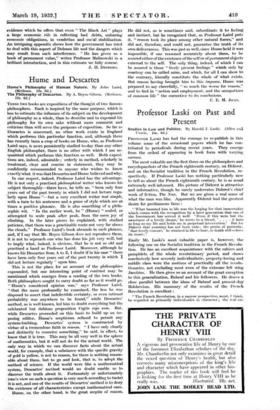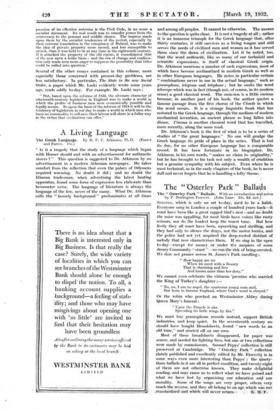Professor Laski on Past and Present
PROFESSOR LASKI has had the courage to re-publish in this volume some of the occasional papers which he has con- tributed to periodicals during recent years. They emerge from the ordeal of appearing in book form with varying success.
The most valuable are the first three on the philosophers and encyclopaedists of the French eighteenth century, on Diderot, and on the Socialist tradition in the French Revolution, re- spectively. If Professor Laski has nothing particularly new to tell us about the French eighteenth century, he is as usual extremely well informed. His picture of Diderot is attractive and informative, though he surely underrates Diderot's chief work of fiction, The Nun. But we are given a real sense of what the man was like. Apparently Diderot had the greatest desire for posthumous fame
" What haunted him in life was the longing for that immortality which comes with the recognition by a later generation that one of the forerunners has served it well. ' Even if this were but tho sweetness of a lovely dream,' he wrote to a friend, ' . . . . it lasts as long as my life and holds me in perpetual intoxication.' But for Diderot that yearning has not been vain ; the praise of posterity. ' that lovely concert,' he strained in life to hear, in death still echoes its music."
Easily Mr. Laski's most valuable paper is, however, the following one on the Socialist tradition in the French Revolu- tion. He has an excellent acquaintance with the colliers and pamphlets of the whole revolutionary period, and shows conclusively how severely individualistic, property-loving and middle class were the motives of practically all the revolu. tionaries, not excluding most even of the extreme left wing Jacobins. He then gives us an account of the great exception to this generalization, Babeuf and his followers. Ile draws a close parallel between the ideas of Babeuf and present-day Bolshevism. Ills summary of the results of the French Revolution is excellent :
" The French Revolution, in a narrow perspective, must, 1 think, be regarded as primarily individualist in character ; the real ex- pression of its effective outcome is the Civil Code, in no sense a socialist document. Its real result was to transfer power from the aristocracy, to the peasant and middle classes. The Impress made upon them by tho socialist tendencies of the period, especially by their extreme translation in the conspiracy of Bobcat, was to make the idea of private property more sacred, and less susceptible to attack, than it was held to be at any time in the eighteenth century. If it attacked the property of the old regime, it consolidated that of the new upon a wider basis ; and the era of change and confisca- tion only made men more eager to suppress the possibility that titles could be called into question."
Several of the other essays contained in this volume, more especially those concerned with present-day problems, are less satisfactory. In particular, The State in the new Social Order, a paper which Mr. Laski evidently wrote some years ago, reads oddly to-day. For example, Mr. Laski says : " But, based upon the reforms of 1832, the ultimate character of nineteenth-century legislation in England was to make a world in which the profits of business men were economically possible and legally secure. So upon the basis of the reforms of 1918 it will be the tendency of legislation in our day to make a world in which men who have no commodity to sell save their labour will share in a fuller way in the riches that civilization can offer."







































 Previous page
Previous page